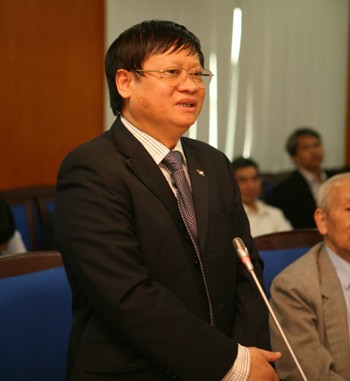(VOVworld)- The Constitution of the Socialist Republic of Vietnam, revised in 2013, officially came into force on January 1st, 2014. Promoting the people’s power dominates the Constitution and is the fundamental content of all articles and chapters, which specifies that the origin, nature and strength of state power is from the people, belongs to the people and that the people are the supreme masters of state power. Today, VOV brings you excerpts from an article entitled “People’s power” by Professor Doctor Vu Van Hien, Vice President of the Central Theoretical Council.

Professor Doctor Vu Van Hien, Vice President of the Central Theoretical Council.
|
The Constitution of the Socialist Republic of Vietnam, revised in 2013, declares: “The Socialist Republic of Vietnam is mastered by the people, all state power belongs to the people on the foundation of the alliance of workers, farmers and intellectuals”.
From both theoretical and practical perspectives, the stipulation of the Constitution, revised in 2013, that all state power belongs to the people is based on a firm foundation.
All State power belongs to people
In the past 83 years of leading the nation in its liberation struggle and socialism building, the Communist Party of Vietnam has learned the historic lesson that revolution is the people’s cause, which is carried out by the people and for the people.
President Ho Chi Minh, an outstanding leader of Vietnam, always stressed the importance of the people. After wresting back power and setting up a new State, the President said that the State was of the people, by the people and for the people.
In the “Platform on national construction in the transitional period to socialism in 1991”, the principle of organizing the State specified that the Vietnamese State unifies legislative, executive and judicial rights with the transparent delegation of these rights. In this spirit, the Resolution of the 9th National Party Congress affirmed that the Vietnamese State is the main tool for the people to exercise their right to mastery and that the Vietnamese State is a state governed by law, of the people, by the people and for the people. The State power is unified and delegated and coordinated between state apparatuses in exercising legislative, executive and judicial rights. The 11th National Party Congress adopted the Platform on national construction in the transitional period to socialism, supplemented and developed in 2011, which says: “Our state is a socialist state governed by law, of the people, by the people, and for the people”.
So, the definition that the supreme power of the Vietnamese state belongs to the people reflects the consistent and immutable stance of the Communist Party of Vietnam.
Reflection of people’s power in the Constitution
All chapters and articles of the Constitution are dominated by the idea that all state power belongs to the people and focuses on the people, which means that state legislative, executive and judicial power should serve the people, ensure the people’s right to mastery and is authorized and delegated by the people. The manner of organizing power and exercising power in all state apparatuses must serve the people’s common interests and be held responsible before people. This is the firm foundation to minimize extremism and irresponsibility by agencies and individuals who are authorized by the people to exercise power. This is also the foundation to set up mechanism for inspecting and evaluating the performance of state agencies.
On the consistent stance of state power belonging to the people, the Constitution stipulates specifically how people exercise their rights including the election of National Assembly deputies. Elected National Assembly deputies will be supervised and evaluated by the people.
The Constitution also stipulates clearly the people’s right to make decisions, contribute opinions to major national issues, and participate in referendums conducted by the National Assembly’s Standing Committee.
Mechanism to exercise the people’s power
The effective exercise of the people’s power is based on the mechanism of ensuring the Party’s leadership, the people’s mastery and the state’s management. Under this mechanism, “the people’s mastery” is the overriding factor. The Party and State are not beyond the people’s mastery.
On the principle that all resources of society and the state belong to the people, it is necessary to ensure a certain level of physical-cultural and social development and improve people’s intellectuality. To this end, it is necessary to improve people’s material and spiritual lives, ensure sustainable social security and equality for people in all regions. People’s intellectuality is reflected in their understanding of and respect for the law and discipline, and their awareness of natural and social development and of their tasks and responsibilities toward society.
By improving people’s intellectuality and economic-political-cultural-social conditions, the people’s power will be enhanced and the goal of a rich people, a prosperous country and an equal, democratic and civilized society will be successfully achieved.
.